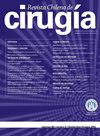El papel de los mastocitos en la evaluación de la respuesta inflamatoria posoperatoria, al implantar mallas protésicas para la reparación de defectos de la pared abdominal en biomodelos rata Wistar
Q4 Medicine
引用次数: 0
Abstract
Objective: The objective of this study was to evaluate the role of mast cells in the postoperative inflammatory response after implantation of prosthetic mesh to repair abdominal wall defects in Wistar rat. Materials and Methods: An abdominal wall defect (30 x 20 mm) was created in the anterior abdominal wall of 25 adult male Wistar rats. The anatomical defect was then repaired with one of the two type’s meshes. Fibroin and monocryl ultrapo prolene meshes. Fibroin meshes were manufactured by weaving its threads, the polypropylene mesh was bought to Johnson & Johnson-Ethicon. After 28 days of implantation Wistar rats were sacrificed and the mesh with abdominal tissue was extracted. Subsequently the samples were treated with histochemical techniques for histological analysis. Results: The study reported adherence to omentum in both types of meshes used, however, the polypropylene mesh showed widely adhesions to colon, slight to intestine and liver, also in a very lower amount, adhesions to omentum. It was found that mast cells were presented in all the studied regions for the polypropylene mesh (dermis, perimysium, and visceral serosa). Discussion: Studies indicate that mast cells and their products such as histamine, serotonin, and others play a key role in controlling local inflammation, wound healing, adhesions, and reactions to foreign bodies in vivo. Conclusion: We can conclude that this study is a good step to show the possible role of mast cells in the abdominal wall repair process.在Wistar大鼠生物模型中,肥大细胞在植入假网修复腹壁缺损时评价术后炎症反应的作用
目的:本研究旨在探讨肥大细胞在Wistar大鼠植入人工补片修复腹壁缺损术后炎症反应中的作用。材料与方法:25只成年雄性Wistar大鼠前腹壁缺损(30 × 20 mm)。然后用两种类型的补片中的一种修复解剖缺陷。丝素和单基超聚丙烯网。丝素网是用丝线编织而成的,聚丙烯网是购买给强生公司的。植入28 d后处死Wistar大鼠,取出腹腔组织网片。随后用组织化学技术处理样品进行组织学分析。结果:研究报告了两种类型的网片对网膜的粘附,但聚丙烯网片对结肠的粘附广泛,对肠和肝的粘附轻微,对网膜的粘附量也很低。发现聚丙烯网的所有研究区域(真皮、膜周和内脏浆膜)均存在肥大细胞。讨论:研究表明肥大细胞及其产物如组胺、血清素等在体内控制局部炎症、伤口愈合、粘连和对异物的反应中起关键作用。结论:本研究为揭示肥大细胞在腹壁修复过程中的可能作用迈出了良好的一步。
本文章由计算机程序翻译,如有差异,请以英文原文为准。
求助全文
约1分钟内获得全文
求助全文
来源期刊

Revista Chilena De Cirugia
Medicine-Surgery
CiteScore
0.20
自引率
0.00%
发文量
0
审稿时长
6-12 weeks
期刊介绍:
La Revista Chilena de Cirugía es un órgano de difusión del conocimiento y actividad quirúrgica. Su población objetivo son cirujanos, especialistas de otras áreas médicas, médicos generales y alumnos del área de la salud.
Sirve a cirujanos y otros especialistas, para publicar artículos originales e inéditos sobre temas médicos, en particular artículos de investigación básica y clínica, artículos de revisión, entre otros.
Buscan difundir y actualizar el conocimiento médico general y quirúrgico en particular. Se publica en forma bimestral.
La Revista Chilena de Cirugía está afiliada y patrocinada por la Sociedad de Cirujanos de Chilese desde el año 1952.
 求助内容:
求助内容: 应助结果提醒方式:
应助结果提醒方式:


